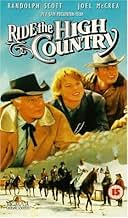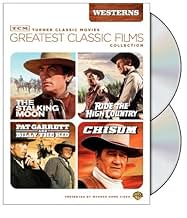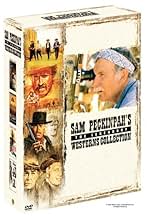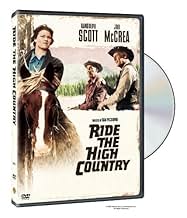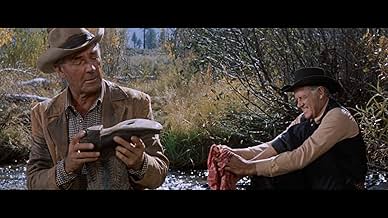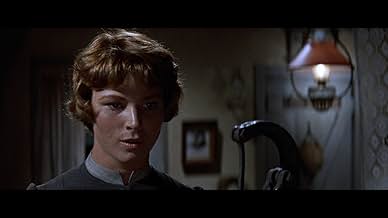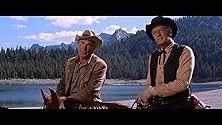VALUTAZIONE IMDb
7,4/10
15.653
LA TUA VALUTAZIONE
Un ex soldato viene assunto per trasportare oro da una comunità mineraria attraverso un territorio pericoloso.Un ex soldato viene assunto per trasportare oro da una comunità mineraria attraverso un territorio pericoloso.Un ex soldato viene assunto per trasportare oro da una comunità mineraria attraverso un territorio pericoloso.
- Regia
- Sceneggiatura
- Star
- Nominato ai 1 BAFTA Award
- 2 vittorie e 2 candidature totali
Alice Allyn
- Candy
- (non citato nei titoli originali)
George Bell
- Townsman
- (non citato nei titoli originali)
Oscar Blank
- Miner
- (non citato nei titoli originali)
Chet Brandenburg
- Miner
- (non citato nei titoli originali)
Don Brodie
- Spieler
- (non citato nei titoli originali)
Chris Carter
- Rose
- (non citato nei titoli originali)
Recensioni in evidenza
Randolph Scott and Joel McCrea will probably be remembered as the top "B" western stars in movies. But their last film "Ride the High Country" stands as an "A" western and a very good one too.
Perhaps they owe this final chance to director Sam Peckinpah who turns the story into a splendid film in its genre shot in beautiful outdoor sceneries, with very well managed action scenes, a credible script, great settings and a fine musical score too.
Two moments are particularly outstanding in my opinion: the sort of "Fellinesc" sequence at the wedding with all those bizarre characters and the final showdown where Scott and McCrea face the mean Hammond brothers (John Anderson, James Drury and Warren Oates) in the "old fashioned way".
A well deserved "A" product for both actors -that amused and thrilled us western fans- through their long careers in the genre.
Perhaps they owe this final chance to director Sam Peckinpah who turns the story into a splendid film in its genre shot in beautiful outdoor sceneries, with very well managed action scenes, a credible script, great settings and a fine musical score too.
Two moments are particularly outstanding in my opinion: the sort of "Fellinesc" sequence at the wedding with all those bizarre characters and the final showdown where Scott and McCrea face the mean Hammond brothers (John Anderson, James Drury and Warren Oates) in the "old fashioned way".
A well deserved "A" product for both actors -that amused and thrilled us western fans- through their long careers in the genre.
This is an important western because the subplot of a young woman's life in the remote west is addressed. At this time many women were looked upon as chattel. Here a young woman escapes farm life with an overbearing religious father who beats her, to flee into marriage with a redneck miner who beats her and plans to share her with his brothers and father. The lead character played by veteran Joel McCrea is trying to earn an honorable living because there is no pension or social security benefits for him to rely on. Randolph Scott is trying to score some easy dough to last during his retirement. A fine movie about morality, honor, and duty.
After a time working as director and writer of Western TV Series, Sam Peckinpah started his career on film with "The Deadly Companions",a romantic Western that seemed like an extension of his work on TV; however, his next film, "Ride the High Country", was an completely different beast, it was a deep meditation on the long-lived Western genre that introduced themes that would become Peckinpah's obsessions and signature: the end of an era and the quest for redemption and meaning in life. This raw masterpiece faced a cold reception when it premiered, but gained a tremendous success overseas (winning the Belgium Film Festival), demonstrating to the world that this newcomer was here to stay.
Former lawman Steve Judd (Joel McCrea) is now an aging man, and is hired to transport gold from a mining community through a dangerous territory. As he has the need to hire assistants, he finds his old friend and former partner Gil Westrum (Randolph Scott) and hires him and Westrum's young protegé, Heck Longtree (Ron Starr) to assist him. However, Steve doesn't know that his two assistants are planning to steal the gold, with or without Steve's help. Things will get complicated when the trio is forced to help a young woman named Elsa (Mariette Hartley) to escape from her fianceé and his criminal brothers.
Written by another veteran of Western TV series, N.B. Stone Jr. (who without a doubt worked with Peckinpah in "The Rifleman"), "Ride The High Country" is a clear step forward in the evolution of the Western as a film genre. As one of the first "revisionist" westerns, it shows a meditation on the genre and how two aging men become outdated by their world and suddenly obsolete. Through powerful lines of dialog and a slowly and carefully constructed plot, the film shows Peckinpah's favorite themes like honor, loyalty, redemption and the destruction of the West (both the historical one and the Western genre) for the first time in one of the most moving Westerns ever. As many have pointed out, one doesn't need to like Westerns to appreciate this film, as it's basic theme of humanity facing change is an immortal one.
Peckinpah's love for the genre is quite obvious and lead to an awesome use of the genre's elements. Starting with a great camera-work that stands as a heir of John Ford's, exchanging Ford's Monument Valley for the beauty nature of Inyo National Forest in California. Forecasting the Spaghetti Western revolution, Peckinpah's realistic Western makes its first appearance, and even when it's considerably less raw than the violent world of "The Wild Bunch", it's a step ahead of the classic Western. In many ways this was not only the beginning of Peckinpah's career, but also of the revisionism in Westerns and the evolution that would change the genre forever.
The inspired casting of Randolph Scott and Joel McCrea in the lead roles is simply brilliant, as no one else but this former legends of classic Western films could embody the meaning of their characters, two old men that easily could had been the future of the many lawmen these two actor played in their lives. It was Scott's last film before retiring, and really it couldn't been a better closure for a career. Newcomers Mariette Hartley and Ron Starr represent the new West, too naive and ignorant of the past that precedes them; and both actor's performances are top-notch, although Starr is definitely the weakest link in the cast.
It's hard to believe that this movie almost was a failure in the U.S., but fortunately now it is receiving the attention it rightfully deserves. The natural landscape and the contrast of the new and the old make a great visual composition, almost as the missing link between the classic golden age of Ford and Wayne, and its modern counterparts. The film has few minor flaws, such as the average performance of some members of the cast, but nothing really annoying. Modern viewers may feel it moves too slow, but that slow pace actually enhances the feeling of that slow but steady change that suddenly caught the characters.
"Ride the High Country" is not a very famous film, but it really deserves a wider audience, not only because it introduced us to Peckinpah's film-making, but also because of its deep meditation on the Western genre and its wonderful immortal theme of mankind facing change. All in all, this film is a very recommended one, and I dare to say it's Peckinpah's first raw masterpiece. 9/10
Former lawman Steve Judd (Joel McCrea) is now an aging man, and is hired to transport gold from a mining community through a dangerous territory. As he has the need to hire assistants, he finds his old friend and former partner Gil Westrum (Randolph Scott) and hires him and Westrum's young protegé, Heck Longtree (Ron Starr) to assist him. However, Steve doesn't know that his two assistants are planning to steal the gold, with or without Steve's help. Things will get complicated when the trio is forced to help a young woman named Elsa (Mariette Hartley) to escape from her fianceé and his criminal brothers.
Written by another veteran of Western TV series, N.B. Stone Jr. (who without a doubt worked with Peckinpah in "The Rifleman"), "Ride The High Country" is a clear step forward in the evolution of the Western as a film genre. As one of the first "revisionist" westerns, it shows a meditation on the genre and how two aging men become outdated by their world and suddenly obsolete. Through powerful lines of dialog and a slowly and carefully constructed plot, the film shows Peckinpah's favorite themes like honor, loyalty, redemption and the destruction of the West (both the historical one and the Western genre) for the first time in one of the most moving Westerns ever. As many have pointed out, one doesn't need to like Westerns to appreciate this film, as it's basic theme of humanity facing change is an immortal one.
Peckinpah's love for the genre is quite obvious and lead to an awesome use of the genre's elements. Starting with a great camera-work that stands as a heir of John Ford's, exchanging Ford's Monument Valley for the beauty nature of Inyo National Forest in California. Forecasting the Spaghetti Western revolution, Peckinpah's realistic Western makes its first appearance, and even when it's considerably less raw than the violent world of "The Wild Bunch", it's a step ahead of the classic Western. In many ways this was not only the beginning of Peckinpah's career, but also of the revisionism in Westerns and the evolution that would change the genre forever.
The inspired casting of Randolph Scott and Joel McCrea in the lead roles is simply brilliant, as no one else but this former legends of classic Western films could embody the meaning of their characters, two old men that easily could had been the future of the many lawmen these two actor played in their lives. It was Scott's last film before retiring, and really it couldn't been a better closure for a career. Newcomers Mariette Hartley and Ron Starr represent the new West, too naive and ignorant of the past that precedes them; and both actor's performances are top-notch, although Starr is definitely the weakest link in the cast.
It's hard to believe that this movie almost was a failure in the U.S., but fortunately now it is receiving the attention it rightfully deserves. The natural landscape and the contrast of the new and the old make a great visual composition, almost as the missing link between the classic golden age of Ford and Wayne, and its modern counterparts. The film has few minor flaws, such as the average performance of some members of the cast, but nothing really annoying. Modern viewers may feel it moves too slow, but that slow pace actually enhances the feeling of that slow but steady change that suddenly caught the characters.
"Ride the High Country" is not a very famous film, but it really deserves a wider audience, not only because it introduced us to Peckinpah's film-making, but also because of its deep meditation on the Western genre and its wonderful immortal theme of mankind facing change. All in all, this film is a very recommended one, and I dare to say it's Peckinpah's first raw masterpiece. 9/10
"All I want is to Enter My House Justified"
Sam Peckinpah's second feature film is today standing up as a must see and must own for those interested in the Western genre.
The film sees ageing lawman Steve Judd land a job of escorting a gold shipment safely to a bank in Hornitos. After running into old friend, and fellow aged lawman Gil Westrun, he hires both he and his young sparky sidekick Heck Longtree to hopefully see the job through to a successful conclusion. Yet Gil has other ideas, for where Steve is upstanding and adhering to the values he has lived his life by, Gil sees this as one last chance to actually get a big payday. The journey takes a further twist as the three men meet and then save Elsa Knudsen from a brutal marriage, it's an incident that puts them all on a collision course with the Hammond brothers.
What we have here is Sam Peckinpah's first film dealing with men who have outlived their time. We witness some emotionally poignant stuff as the two main protagonists know that they have aged beyond their world, yet as alike as they are, they have different ideals in how to deal with the advent of time. The masterstroke here is the casting of genre legends Joel McRea & Randolph Scott as Steve & Gil respectively. It's evident from the off that both men are identifying with their characters, with both men hitting top emotional form to fully realise the thematic heart of the story. Mariette Hartley makes her film debut as Elsa, and she fits in nicely with the quality on show behind and in front of the camera. Lucien Ballard's cinematography is gorgeous as the various California locations envelope the protagonists in a sort of elegiac way, and Peckinpah directs with his heart as well as his head.
Bookended by two heart-achingly super sequences, of which the finale has rightly passed into Western genre legend, this really is a strong and beautiful film, one that simultaneously shows a truly great director was at work. For here he was left alone, and the final result is a quality Western beating far more than just a cowboy heart. The supporting cast is strong, notably Edgar Buchanan, L.Q. Jones & John Anderson, while the undervalued George Bassman provides a narratively fitting tonal music score. If there is a criticism? it's that Peckinpah doesn't let the younger characters breath, but given the film's core focus on aged men in an aged passing era, well it's easily forgiven. A precursor to The Wild Bunch for sure, but while the theme is the same for both films, this one impacts in a very different way. Highly recommended, not just for the Oater crowd, but for fans of classic cinema too. 9/10
Sam Peckinpah's second feature film is today standing up as a must see and must own for those interested in the Western genre.
The film sees ageing lawman Steve Judd land a job of escorting a gold shipment safely to a bank in Hornitos. After running into old friend, and fellow aged lawman Gil Westrun, he hires both he and his young sparky sidekick Heck Longtree to hopefully see the job through to a successful conclusion. Yet Gil has other ideas, for where Steve is upstanding and adhering to the values he has lived his life by, Gil sees this as one last chance to actually get a big payday. The journey takes a further twist as the three men meet and then save Elsa Knudsen from a brutal marriage, it's an incident that puts them all on a collision course with the Hammond brothers.
What we have here is Sam Peckinpah's first film dealing with men who have outlived their time. We witness some emotionally poignant stuff as the two main protagonists know that they have aged beyond their world, yet as alike as they are, they have different ideals in how to deal with the advent of time. The masterstroke here is the casting of genre legends Joel McRea & Randolph Scott as Steve & Gil respectively. It's evident from the off that both men are identifying with their characters, with both men hitting top emotional form to fully realise the thematic heart of the story. Mariette Hartley makes her film debut as Elsa, and she fits in nicely with the quality on show behind and in front of the camera. Lucien Ballard's cinematography is gorgeous as the various California locations envelope the protagonists in a sort of elegiac way, and Peckinpah directs with his heart as well as his head.
Bookended by two heart-achingly super sequences, of which the finale has rightly passed into Western genre legend, this really is a strong and beautiful film, one that simultaneously shows a truly great director was at work. For here he was left alone, and the final result is a quality Western beating far more than just a cowboy heart. The supporting cast is strong, notably Edgar Buchanan, L.Q. Jones & John Anderson, while the undervalued George Bassman provides a narratively fitting tonal music score. If there is a criticism? it's that Peckinpah doesn't let the younger characters breath, but given the film's core focus on aged men in an aged passing era, well it's easily forgiven. A precursor to The Wild Bunch for sure, but while the theme is the same for both films, this one impacts in a very different way. Highly recommended, not just for the Oater crowd, but for fans of classic cinema too. 9/10
RIDE THE HIGH COUNTRY proves that the Old West was a dangerous place for anyone willing to transport gold from a mining town to a bank with a couple of double-crossing cronies as companions and a runaway girl to protect.
JOEL McCREA and RANDOLPH SCOTT are the willing participants, a lawman and his corrupt pal, and MARIETTE HARTLEY is the girl who wants to escape the clutches of a cruel father and marry Billy Hammond (JAMES DRURY). She joins Scott and McCrea but doesn't realize what she's in for when she meets up with her ornery fiancé and his psychotic brothers, one of whom is played by WARREN OATES. She also has to contend with the advances of Scott's young pal, RON STARR, who doesn't want to see her get mixed up with Drury and his brothers.
The plot stays focused on these characters, moves slowly and is photographed with finesse by Lucien Ballard who filmed it in CinemaScope and Metrocolor in some gorgeous natural settings. It's a character-driven tale that has a moral compass but never becomes too preachy in the telling.
First-rate performances by McCrea and Scott hold the film together with the others being competent enough to stand inspection. The big mystery to me is: What happened to Ron Starr? He was certainly adequate enough and seemed to grow in the role as the film progressed, looking somewhat like a young Glenn Campbell. His bio at IMDb is very incomplete, so there's no telling what actually happened to him.
Summing up: Sturdy western with downbeat ending is interesting all the way through.
JOEL McCREA and RANDOLPH SCOTT are the willing participants, a lawman and his corrupt pal, and MARIETTE HARTLEY is the girl who wants to escape the clutches of a cruel father and marry Billy Hammond (JAMES DRURY). She joins Scott and McCrea but doesn't realize what she's in for when she meets up with her ornery fiancé and his psychotic brothers, one of whom is played by WARREN OATES. She also has to contend with the advances of Scott's young pal, RON STARR, who doesn't want to see her get mixed up with Drury and his brothers.
The plot stays focused on these characters, moves slowly and is photographed with finesse by Lucien Ballard who filmed it in CinemaScope and Metrocolor in some gorgeous natural settings. It's a character-driven tale that has a moral compass but never becomes too preachy in the telling.
First-rate performances by McCrea and Scott hold the film together with the others being competent enough to stand inspection. The big mystery to me is: What happened to Ron Starr? He was certainly adequate enough and seemed to grow in the role as the film progressed, looking somewhat like a young Glenn Campbell. His bio at IMDb is very incomplete, so there's no telling what actually happened to him.
Summing up: Sturdy western with downbeat ending is interesting all the way through.
Lo sapevi?
- QuizFinal film of Randolph Scott. He retired from acting once he saw the finished film, saying he wanted to quit while he was ahead and that he would never be able to better his work here.
- BlooperThe many 34-star flags, all on flagpoles, at the opening of the movie do not match the Bobby helmets, open automobiles and electric wiring over the streets. The 34-star U.S. flag was in use only from 1861-1863. There is, however, also an inconsistent 45-star flag strung across the street. That design, in use from 1896-1908, does match the movie's time setting.
- Citazioni
Steve Judd: All I want is to enter my house justified.
- Curiosità sui creditiIntroducing Mariette Hartley
- ConnessioniFeatured in America at the Movies (1976)
I più visti
Accedi per valutare e creare un elenco di titoli salvati per ottenere consigli personalizzati
Dettagli
- Data di uscita
- Paese di origine
- Lingue
- Celebre anche come
- Pistoleros al atardecer
- Luoghi delle riprese
- Mammoth Lakes, California, Stati Uniti(Twin Lake, Horseshoe Lake)
- Azienda produttrice
- Vedi altri crediti dell’azienda su IMDbPro
Botteghino
- Budget
- 813.000 USD (previsto)
- Tempo di esecuzione
- 1h 34min(94 min)
- Colore
- Proporzioni
- 2.35 : 1
Contribuisci a questa pagina
Suggerisci una modifica o aggiungi i contenuti mancanti


